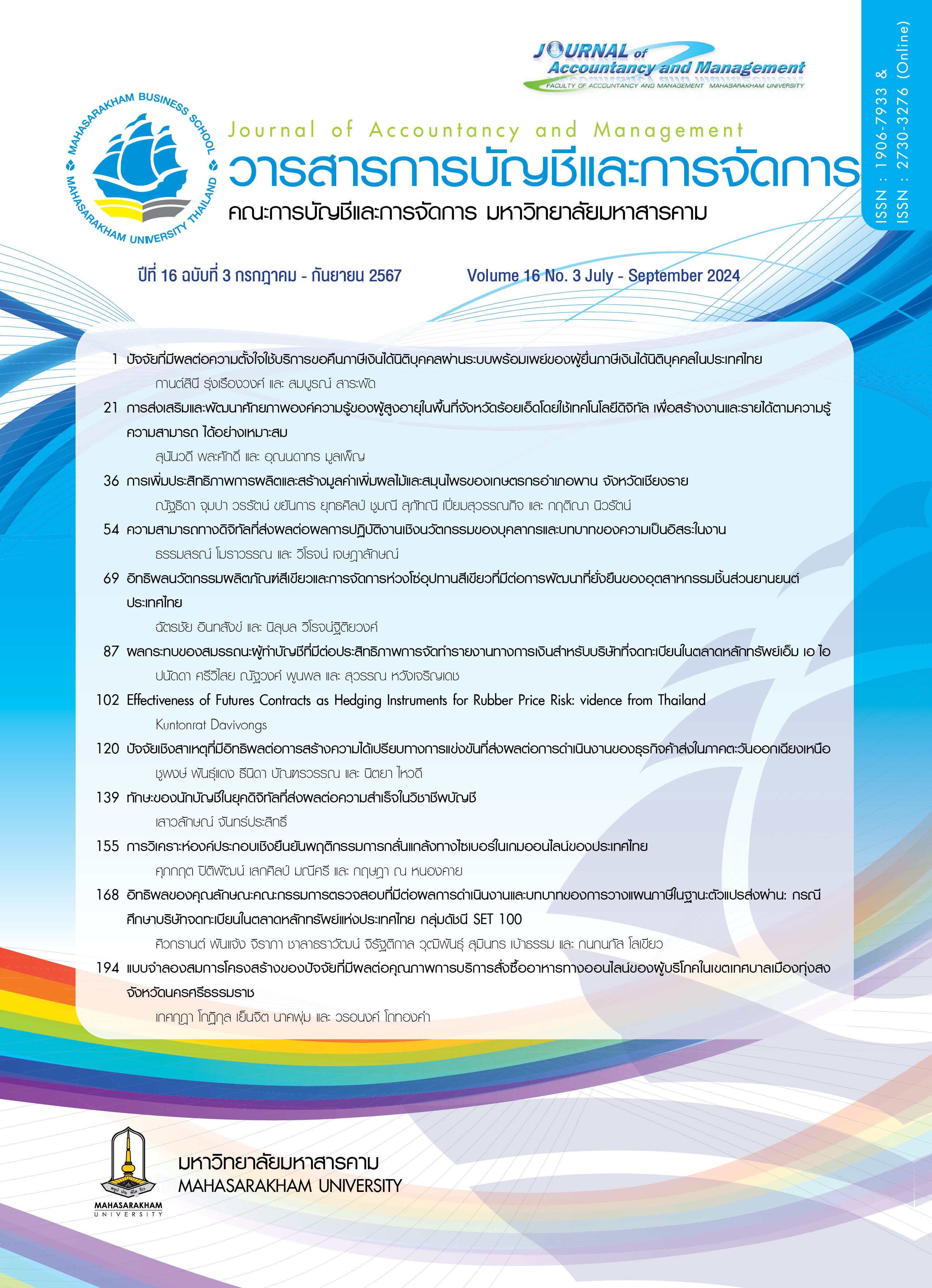Digital Accounting Skills Affecting the Success of Professional Accountant
Main Article Content
Abstract
The objective of this research is to investigate the impact of both hard and soft skills on the success of accountants within the digital era. A total of 88 accountants employed in accounting firms located in the southern region of Thailand (specifically, Songkhla, Trang, Narathiwat, Pattani, Phatthalung, Yala, and Satun) participated in this study, with data collected through questionnaires. The data analysis involved a range of statistical methods, including the calculation of means, percentages, standard deviations and multiple regression analysis. The findings indicated that accountants demonstrated a commendable proficiency in both hard and soft skills, with high overall competence. In terms of hard skills, the three most prominent areas of expertise were digital technology proficiency, adherence to operational standards, and adeptness in organizational management. Among soft skills, the three with the highest average ratings included exceptional time management capabilities, adaptability, and strong leadership qualities. Accountants' hard skills in the digital age, analytical and organizational, positively influenced the overall success of the accounting profession. In terms of soft skills of accountants in the digital era, problem solving communication and the aspect of lifelong learning had a positive influence on the overall success of the accounting profession. In summary, it becomes evident that accountants thriving in the digital era can achieve professional success by possessing a harmonious blend of both technical and interpersonal skills. Hence, it is imperative for accounting professionals to prioritize the utilization of research findings as a foundational framework for continuously cultivating their professional expertise and competencies. This practice is essential for augmenting their effectiveness in delivering high-quality work, ultimately paving the path to enduring success within the realm of accounting.
Downloads
Article Details

This work is licensed under a Creative Commons Attribution-NonCommercial-NoDerivatives 4.0 International License.
บทความที่ได้รับการตีพิมพ์เป็นลิขสิทธิ์ของวารสารการบัญชีและการจัดการ
ข้อความที่ปรากฏในบทความแต่ละเรื่องในวารสารวิชาการเล่มนี้เป็นความคิดเห็นส่วนตัวของผู้เขียนแต่ละท่านไม่เกี่ยวข้องกับมหาวิทยาลัยมหาสารคาม และคณาจารย์ท่านอื่นๆในมหาวิทยาลัยฯ แต่อย่างใด ความรับผิดชอบองค์ประกอบทั้งหมดของบทความแต่ละเรื่องเป็นของผู้เขียนแต่ละท่าน หากมีความผิดพลาดใดๆ ผู้เขียนแต่ละท่านจะรับผิดชอบบทความของตนเองแต่ผู้เดียว
References
กมลภู สันทะจักร์ และกนกศักดิ์ สุขวัฒนาสินิทธิ์. 2562. ปัจจัยของนักบัญชียุคดิจิทัลที่มีผลต่อผลสัมฤทธิ์ในการปฏิบัติงานของหน่วยงานราชการในประเทศไทย. วารสารหาดใหญ่วิชาการ, 17(1), 17-31.
จารุวรรณ แซ่เต้า. (2564). ความสัมพันธ์ระหว่างทักษะวิชาชีพบัญชีในยุคดิจิทัลกับความสำเร็จในการทำงานของผู้บริหารฝ่ายบัญชีบริษัทจดทะเบียนในตลาดหลักทรัพย์แห่งประเทศไทย. วิทยานิพนธ์ บัญชีมหาบัณฑิต มหาสารคาม มหาวิทยาลัยมหาสารคาม.
ชลิดา ลิ้นจี่ กนกมณี หอมแก้ว และ สุภาพร บุญเอี่ยม. (2563). ความรู้และทักษะวิชาชีพของนักบัญชีสำนักงานบัญชีคุณภาพในประเทศไทย. วารสารศิลปะการจัดการ, 4(1), 34-45.
ดลหทัย อนุตธโต. (2563). ทักษะวิชาชีพบัญชีและความผูกพันต่อองค์กรที่มีผลต่อประสิทธิภาพการปฏิบัติงานของข้าราชการเหล่าการเงิน มณฑลทหารบกที่ 12 ในค่ายจักรพงษ์ จังหวัดปราจีนบุรี. ค้นคว้าอิสระ. บริหารธุรกิจมหาบัณฑิต มหาวิทยาลัยเทคโนโลยีราชมงคลธัญบุรี.
ประสัณห์ เชื้อพานิช. (2560). บทบาทนักบัญชีในยุค Digital Transformation. จดหมายข่าวสภาวิชาชีพบัญชีใน
พระบรมราชูปถัมภ์, 72(2), 18.
พิชัย ชุณหวชิร. (2561). ก้าวสู่นักบัญชีแห่งโลกอนาคต. จดหมายข่าวสภาวิชาชีพบัญชีในพระบรมราชูปถัมภ์, 71, 19.
วัทธยา พรพัฒน์กุล. (2563). นักบัญชีบริหารในยุคดิจิทัล. ค้นเมื่อ 24 มิถุนายน 2565, จาก https://www.tfac.or.th/Article/Detail/126283.
วสันต์ ครองมี ปุณยวีร์ ยังดี และ พุฒิสรรค์ เกตุมรรค. (2563). ผลกระทบของทักษะนักบัญชียุคดิจิทัลที่มีผลต่อความสําเร็จในการทํางานของผู้ทําบัญชีในสํานักงานบริการด้านบัญชี จังหวัดเชียงใหม่. วารสารบริหารธุรกิจ มหาวิทยาลัยแม่โจ้, 2(1), 67-86.
สุกิจ วงศดาวราวัฒน์. (2564). Soft Skills ที่นักบัญชีที่มีในอนาคต. จดหมายข่าวสภาวิชาชีพบัญชีในพระบรมราชูปถัมภ์, (98), 14 – 16.
สภาวิชาชีพบัญชี ในพระบรมราชูปถัมภ์. (2558). มาตรฐานการศึกษาระหว่างประเทศสาหรับผู้ประกอบวิชาชีพบัญชี ฉบับที่ 3. ค้นเมื่อ 24 มิถุนายน 2565, จาก http://www.tfac.or.th/Article /Detail/ 66980.
สุมินทร เบ้าธรรม. (2558). วิจัยทางการบัญชี. กรุงเทพฯ : ทริปเพิ้ล เอ็ดดูเคชั่น.
ศรีสุดา อินทมาศ. (2562). โอกาสข้ามผ่านกรอบความคิดเดิมสู่โลกใหม่สายอาชีพนักบัญชียุคดิจิทัล. ค้นเมื่อ 10 กรกฎาคม 2566. จาก http://www.fap.or.th/upload/9414/zsBw8qK7fy.pdf.
อริยา สรศักดา. (2562). สมรรถนะของนักวิชาชีพบัญชีในยุคดิจิทัลเพื่อพัฒนาคุณภาพสำนักงานบัญชี. สารนิพนธ์ บัญชีมหาบัณฑิต มหาวิทยาลัยธุรกิจบัณฑิตย์.
George, D., & Mallery, P. (2011). SPSS for Windows step by step: A simple guide and reference, 18.0 update. 11th ed. United Kingdom : Pearson.
Krejcie, R. V., & Morgan, D. W. (1970). Determining Sample Size for Research Activities. Educational and Psychological Measurement, 30(3), 607 – 610.
Kokina, J., Davenport, T. H. (2017). The Emergence of Artificial Intelligence: How Automation is Changing Auditing. Journal of Emerging Technologies in Accounting 14(1), 115-122.
Maslow, A. H. (1954). Motivation and Personality. New York : Herper and Brother.
Sestino, A., & de Mauro, A. (2022). Leveraging artificial intelligence in business: implications, applications and methods. Technology Analysis and Strategic Management, 34(1), 16-29.
Tan, L. M., & Laswad, F. (2018). Professional skills required of accountants: what do job advertisements tell us?. Accounting Education, 27(4), 403-432.


